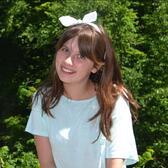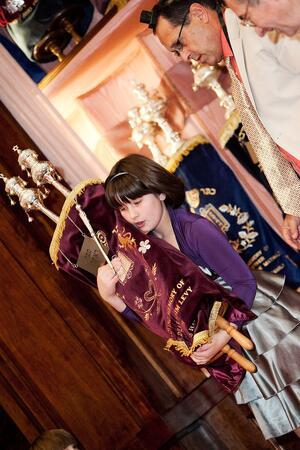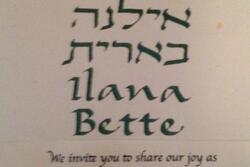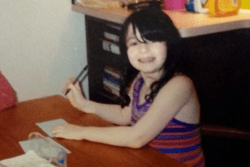Looking Over the Mechitza
Although I wish they were, feminism and Judaism are not congruous in my life. I am a feminist. I am a Jew. But when I put them together, they clash. In my life, being Jewish means that I am a part of my Modern Orthodox community, it means that I go to shul every week and sit in my designated place on the left side of the mechitza, the low wall that separates men and women during prayer. Being a feminist means that I recognize that men and women are equal; it means that I value myself and my opinions just as highly as any man’s.
How can I be both? How can I call myself a feminist while being an active member of a synagogue where I cannot read from the Torah in front of the congregation? How can I be a member of a Modern Orthodox shul, but also believe that I have a right to be counted as part of a minyan, the minimum number of “legal Jewish adults” required for a prayer service? How is it possible to hold such contradicting beliefs so firmly?
My parents have acknowledged that our Jewish identity is not easily classifiable. I have attended many different types of Jewish schools: orthodox, conservative, and pluralistic. I have experienced many different types of Judaism, but I feel most comfortable in the Modern Orthodox community that I’ve grown up in.
I love my community. One beautiful aspect of belonging to a Modern Orthodox shul is that many of the congregants do not drive on Shabbat, which means that they live within walking distance of shul, within walking distance of me. I love the feeling of walking back to my house on Shabbat afternoon, waving hello and saying “Shabbat Shalom” to every person I pass on the street. I’ve shared so many meals with various members of the community that the people I see at shul almost feel like my extended family. I don’t know if I would be able to find this bond so easily outside of a Modern Orthodox community.
But sometimes, I feel almost embarrassed by my participation in Modern Orthodoxy. The fact that women and men do not have equal roles in this denomination of Judaism makes me ambivalent about declaring my allegiance to Modern Orthodox Judaism. Every week, a young boy goes up on the bima, where the cantor usually stands, to lead the last prayer. When I was seven, I asked my parents why I couldn’t have a turn. The answer I got? “We know it’s not fair—we don’t like it, either.”
When it came time for my Bat Mitzvah, my family had quite a few decisions to make regarding my prayer service. We chose to create a service with a mechitza, the partition between men and women so that my service would be halachic—in sync with the “legal” standards of Modern Orthodoxy. We decided not to hold the service at our shul because I wanted to lead the service and read the Torah in front of all my guests, as is customary for males to do, and I would only be allowed to read in front of other women at my temple. I was proud to be the first girl in my family to read from the Torah at her Bat Mitzvah. And yet, I remember waving to my dad from the women’s section, wishing we could all be sitting together.
It’s confusing. It’s a struggle. But it’s not one that I’m willing to stop grappling with. I could easily move synagogues and align myself with another denomination of Judaism that is more gender-equal. I could easily drop my feminist ideals and step back into the comfort of tradition. But neither of those options appeal to me, because I want both. I want to be part of a Jewish community, my community, and I want to be valued as a woman in that setting. My feelings about feminism and equality are not likely to change, but neither is my love and passion for my Jewish community. I want feminism and Judaism to come together so that I don’t have to choose one over the other. Maybe they’ll never intersect, but I hope that one day, they can at least run parallel.
This piece was written as part of JWA’s Rising Voices Fellowship.








Eliana, thank you for sharing your sincere voice with all of us. It takes courage to address this topic so openly and honestly. Congratulations on taking on such a complex topic!
Eliana, you are very sincere and intelligent, just like your parents.
It is difficult to address your dilemma in the framework of a short post, but I want to provide a framework for you to think about.
The Torah is G-d's Word, and as such, it is not easily accessible to mortal men (or women). Halacha is the vehicle by which His Word can be actualized in our physical world. But, if we attempt to measure the infinite by the changing scales of of our own moral compass, we are bound to translate the Torah incorrectly, and misunderstand the message, because we are relating to ideas that are infinite on our own physically biased terms.
The Rambam's ninth principle is that the Torah is "He'etek" - that means: transmuted together with its own context into our world. Attempts to make it fit perfectly into our own culture and lifestyle are futile, for you are bound to discover numerous personal conflicts similar to the one you describe.
Try to study hard and understand the Torah and Halacha as it truly is, and not as we would want it to be.
B'hatzlacha!
How mealymouthed. How can you stand behind the mechitza and not feel yourself in a cage? I tried it for three months and it gave me a stomach ulcer, seeing women oppressed in this way.
The first step in navigating these issues is articulating the struggle. Eliana, you've done that beautifully in this piece. Thank you for sharing your story.
Eliana--you very cogently articlulate only one of many such inner struggles facing a woman of faith in todays world.The ability to define the issues as elegantly as you have, will make your choices that much more easy to reconcile with your Judaism as you mature and are conformted by dilemnas that never quite seem to go away... Beautiful piece!!!
Thank you so much for sharing your story Eliana! I admire your willingness to confront this issue and to share your struggle. You are an inspiration!!!